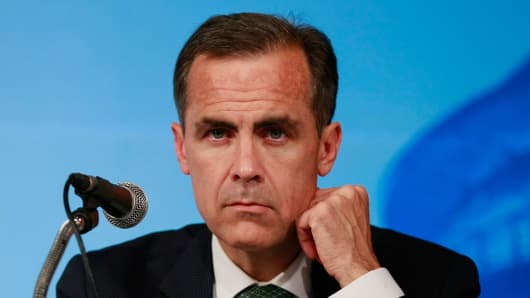Mark Carney, incoming governor of the Bank of England, struck a cautious note on Monday, saying banks were now better placed to withstand financial shocks but warning that they still needed to reform further.
"Financial markets have improved over recent months and important progress has been made in strengthening banks' capital positions. Nonetheless, medium-term downside risks remain, given weak growth prospects and high levels of public and private sector debt in many economies. Continued strains on bank asset quality reinforce the need to complete financial repair."
Returning from the alpine town of Davos, where Carney, currently the Bank of Canada governor, mingled with heads of states and business leaders, he stopped in Zurich on Monday to chair a meeting of the Financial Stability Board (FSB).
The FSB was set up in 2009 to oversee a range of issues by the G20, such as systemically important banks, OTC derivative reforms and the shadow banking sector.
During the World Economic Forum, business leaders and policy makers cautioned against complacency as risk premiums had come down and global equity markets traded at multi year highs. Axel Weber, chairman of UBS, said the mood had been good, maybe too good to be true at the annual gathering in the Swiss ski resort. "I think some expectation management is in order," he said.
While Carney told CNBC on Monday that he didn't see complacency in Davos, he still said that implementation of reforms was key.
"I wouldn't say there's a sense of complacency by policymakers, both on basis of private discussions in Davos and public points made by (IMF Managing Director) Christine Lagarde for example, (Italian Central Bank Governor) Ignazio Visco. I'm not sure I heard a public policymaker exhibit signs of complacency, which is a good thing, because tail risks have been reduced, extreme negative outcomes have been reduced, they certainly haven't been eliminated," he said.
(Read More: IMF's Lagarde: I'm Optimistic About Europe)
"It still requires sustained implementation of policy that extends well beyond actions of central banks to structural policies and national fiscal measures, and in the case of Europe, institution-building that is ultimately going to fully address some of the risks that have been manifest over the past couple of years," Carney said.
The FSB has identified 28 global systemically important financial institutions, which are commonly deemed "too big to fail". The list includes Barclays, Deutsche Bank, Credit Suisse, Santander, Mitsubishi UFJ. These banks are required to have a core tier 1 capital ratio which is up to 3.5 percent higher than those banks which are not systemically important.
Asked whether these "too big to fail" banks' massive share price gains since last year were justified by a reduction in risky assets and improved capital levels, Carney told CNBC: "I'm not going to give you any buy, sell hold calls on the banking systems from an equity perspective advice...but banks around the world have done a lot to improve their capital situation".
"600 billion euros been raised, and these are true capital buffers and many of those are the largest and most systemic banks. And they have also built liquidity. Many, not all banks, also simplified their business models. (It is) important that implementation still has to be finished," he said.





